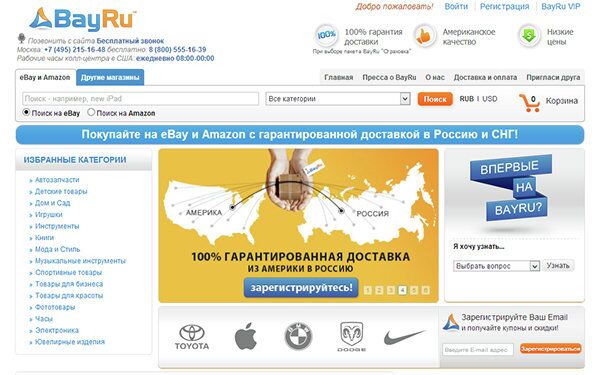WASHINGTON, May 28 (By Maria Young for RIA Novosti) – A Chicago-area company started by two brothers from St. Petersburg is doing for US-Russian trade relations what the Internet has done for dating: connecting like-minded but distant parties in a way designed to benefit them both, and making a bundle in the process, figures supplied Tuesday by the firm show.
The company, BayRu, is a kind of Russian eBay that sees its mission as the “posrednik,” or middleman, between Russians with their eyes on US consumer goods and manufacturers who don’t understand how the Russian market works.
“Russian consumers and US merchants face a tremendous disconnect on many levels... we were put on this earth to solve that problem for both,” said Aaron Block, who was taken on as chief executive officer of BayRu in 2010, three years after the company was founded by two Russian brothers, Anton and Gene German.
After they moved to the US for studies, the brothers created BayRu to help friends and family “back in the old country” get their hands on the consumer goods that were so easy to access in the United States, but difficult, and expensive, to get back home.
“Our company is an example of ‘built by Russians for Russians.’ It’s a very specific niche in the world that we fill, and it happens to be an enormous niche. There’s a billion dollars in 2012 of cross-border ecommerce between the US and Russia, so this is a big, big business and growing fast,” said Block in an interview with RIA Novosti.
BayRu has grown by more than 1,700 percent in the last three years, with sales projected to hit $75 million this year, according to figures supplied by Block. The company was first profitable with gross sales of $20 million in 2011, and had an estimated $40 million in sales in 2012. This year it is expected to ship 250,000 different items to customers in Russia.
“It’s the concept that you got a guy in Chicago, like you got cousin Aaron in Chicago, who makes sure that what you want is exactly what you get, and that it gets there fast, safe and with the service you deserve,” Block said.
But to get BayRu off the ground, there was a long list of challenges to be met: Russia’s economy primarily uses a system of cash on delivery, which creates a problem for international merchants; there are language barriers, service barriers, confusion over customs, regulations and shipping requirements, and a general lack of comfort.
“Russia is a large market of 140 million people, and there’s a clear preference for a localized, Russified solution to goods, so if you look at Yandex versus Google, or you look at Vkontakte versus Facebook, you can see that although they want the product from America, they want the experience from Russia,” said Block.
The brothers’ solution was to access payment points already in existence in stores, train stations and banks across Russia. When buyers enter their cash at one of 500,000 sites throughout the country, including Siberia and the Caucasus, the funds are transferred to BayRu. The company purchases the item the customer has ordered from one of its ecommerce partners, ships it to a warehouse in Chicago, and from there, it is shipped to the consumer in Russia.
The cost? After the price of the product, there is a nine percent markup, plus shipping, insurance and other optional services. Because most of the items purchased are for personal consumption, they are usually exempt from import taxes, customs and duties.
“We have an enormous competitive advantage from being Russia-centric and focused between these two countries. No one else has the depth we have in the US and the depth we have in Russia to solve these common consumer problems,” Block said.
Well, almost no one. The real competition, he admitted, comes from other Russians living in the United States with friends and family in Russia.
“Anybody who’s got an aunt, an uncle, a cousin, a nephew in Brooklyn or Chicago or LA or wherever else they are, can call up and say, ‘Hey, there’s a new iPhone, can you ship it to me? And keep a little money for yourself.’ There are thousands and thousands of competitors in this space, but the good news is, it’s a very big space,” Block said.
The most popular items: Auto parts, followed by fashion and electronics. BayRu also does a booming trade in household goods, toys and collectibles, with a focus on known and trusted brands.
Today BayRu has 120 employees, most of them in the US, and many of them with ties to Russia and the former Soviet Union.
“We have grandmothers recommending their grandchildren to come and work with us, and that makes us feel good – that we have that level of trust in the community from people who are pretty suspicious of the former Soviet Union, folks who were born over there and have memories of harder times,” said Block.




